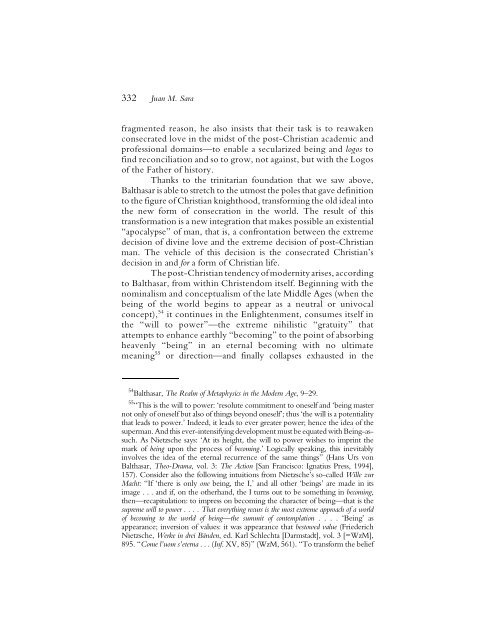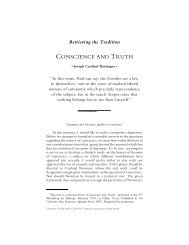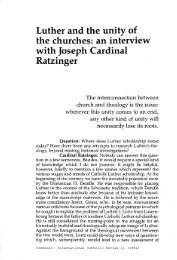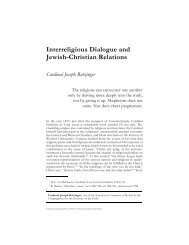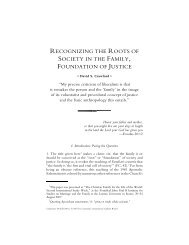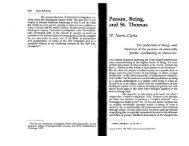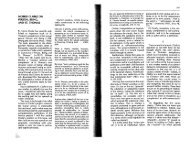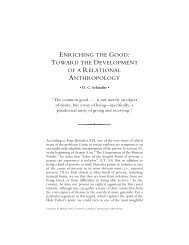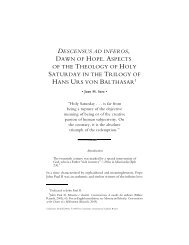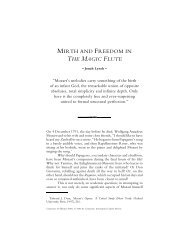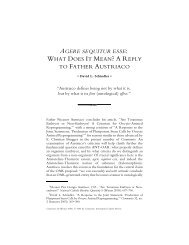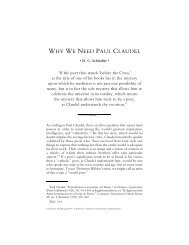Juan Sara. Secular Institutes According to Hans Urs ... - Communio
Juan Sara. Secular Institutes According to Hans Urs ... - Communio
Juan Sara. Secular Institutes According to Hans Urs ... - Communio
Create successful ePaper yourself
Turn your PDF publications into a flip-book with our unique Google optimized e-Paper software.
332 <strong>Juan</strong> M. <strong>Sara</strong><br />
fragmented reason, he also insists that their task is <strong>to</strong> reawaken<br />
consecrated love in the midst of the post-Christian academic and<br />
professional domains—<strong>to</strong> enable a secularized being and logos <strong>to</strong><br />
find reconciliation and so <strong>to</strong> grow, not against, but with the Logos<br />
of the Father of his<strong>to</strong>ry.<br />
Thanks <strong>to</strong> the trinitarian foundation that we saw above,<br />
Balthasar is able <strong>to</strong> stretch <strong>to</strong> the utmost the poles that gave definition<br />
<strong>to</strong> the figure of Christian knighthood, transforming the old ideal in<strong>to</strong><br />
the new form of consecration in the world. The result of this<br />
transformation is a new integration that makes possible an existential<br />
“apocalypse” of man, that is, a confrontation between the extreme<br />
decision of divine love and the extreme decision of post-Christian<br />
man. The vehicle of this decision is the consecrated Christian’s<br />
decision in and for a form of Christian life.<br />
The post-Christian tendency of modernity arises, according<br />
<strong>to</strong> Balthasar, from within Christendom itself. Beginning with the<br />
nominalism and conceptualism of the late Middle Ages (when the<br />
being of the world begins <strong>to</strong> appear as a neutral or univocal<br />
concept), 54 it continues in the Enlightenment, consumes itself in<br />
the “will <strong>to</strong> power”—the extreme nihilistic “gratuity” that<br />
attempts <strong>to</strong> enhance earthly “becoming” <strong>to</strong> the point of absorbing<br />
heavenly “being” in an eternal becoming with no ultimate<br />
meaning 55 or direction—and finally collapses exhausted in the<br />
54 Balthasar, The Realm of Metaphysics in the Modern Age, 9–29.<br />
55 “This is the will <strong>to</strong> power: ‘resolute commitment <strong>to</strong> oneself and ‘being master<br />
not only of oneself but also of things beyond oneself’; thus ‘the will is a potentiality<br />
that leads <strong>to</strong> power.’ Indeed, it leads <strong>to</strong> ever greater power; hence the idea of the<br />
superman. And this ever-intensifying development must be equated with Being-assuch.<br />
As Nietzsche says: ‘At its height, the will <strong>to</strong> power wishes <strong>to</strong> imprint the<br />
mark of being upon the process of becoming.’ Logically speaking, this inevitably<br />
involves the idea of the eternal recurrence of the same things” (<strong>Hans</strong> <strong>Urs</strong> von<br />
Balthasar, Theo-Drama, vol. 3: The Action [San Francisco: Ignatius Press, 1994],<br />
157). Consider also the following intuitions from Nietzsche’s so-called Wille zur<br />
Macht: “If ‘there is only one being, the I,’ and all other ‘beings’ are made in its<br />
image . . . and if, on the otherhand, the I turns out <strong>to</strong> be something in becoming,<br />
then—recapitulation: <strong>to</strong> impress on becoming the character of being—that is the<br />
supreme will <strong>to</strong> power . . . . That everything recurs is the most extreme approach of a world<br />
of becoming <strong>to</strong> the world of being—the summit of contemplation . . . . ‘Being’ as<br />
appearance; inversion of values: it was appearance that bes<strong>to</strong>wed value (Friederich<br />
Nietzsche, Werke in drei Bänden, ed. Karl Schlechta [Darmstadt], vol. 3 [=WzM],<br />
895. “Come l’uom s’eterna . . . (Inf. XV, 85)” (WzM, 561). “To transform the belief


